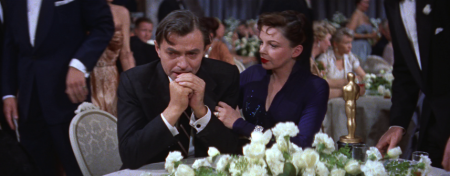 The movie opens with a searchlight literally flaming out. But because the other lights attracting people’s attention for a Hollywood gala keep shining, it doesn’t matter in the grand scheme of things. Thus metaphorically primed, the audience is told the story of Norman Maine, aging movie star and alcoholic. He is irascible and violent when drunk and imperious and self-centred even when not. Despite meeting a nice younger woman, circumstances won’t let him be saved, and the movie tracks his inevitable downfall.
The movie opens with a searchlight literally flaming out. But because the other lights attracting people’s attention for a Hollywood gala keep shining, it doesn’t matter in the grand scheme of things. Thus metaphorically primed, the audience is told the story of Norman Maine, aging movie star and alcoholic. He is irascible and violent when drunk and imperious and self-centred even when not. Despite meeting a nice younger woman, circumstances won’t let him be saved, and the movie tracks his inevitable downfall.
His descent is contrasted with the rise of a new star, Esther (later Vickie, because her real name isn’t marketable enough), discovered by Norman but soon eclipsing him in popularity. Esther is the one who insists on loving and eventually marrying him despite his attempts to push her away, citing his knack for destroying the people around him. Her trust in him is unshakeable and an interesting trait in a character who is otherwise rather shy and vulnerable and who is completely powerless against Norman’s addiction.
—Some spoilers got away—
The film is best known today as a vehicle for the musical talents of Judy Garland (who plays Esther) as well as the parallels between Norman’s troubles and those of the lead actress in real life, which lends special poignancy to those scenes. But while Garland is fine, convincingly portraying Esther’s general mousiness with tendencies to melodramatic hysteria, it’s Mason’s performance that really impressed me. Norman is also the central character even after the focus shifts towards Esther. A 15-minute film-within-a-film about a female actress’s early struggles culminating in a great career doesn’t cap the movie, but forms its mid-way point. Despite its title, A Star Is Born is more interested in a star’s slow death, the consequences for and the culpability of those around him.

I wrote above that the film doesn’t really compare to Bye Bye Birdie and How to Succeed in Business Without Really Trying as a musical, and not just because it’s definitely not a comedy. Given the 3-hour running-time, there are comparatively few songs, and they are mostly superfluous, seemingly shoehorned in to showcase Judy Garland’s singing. It’s not a surprise that the songs don’t feel necessary: the film is a remake of a non-musical drama from 1937 and follows its plot fairly closely, judging from the wikipedia entry.
That said, the songs add a certain texture to the proceedings. Much like other scenes that could probably have been left out (and, in fact, were left out in some versions; some of the cut scenes haven’t survived, and are only presented as still pictures), it doesn’t hurt the film that they remain, because they offer a brief look behind the scenes of the Hollywood machine, an indictment of which is one of the movie’s goals. Only backstage in Hollywood must an actress switch to an exuberant dancing close-up after a soul-wrenching bearing of her soul. The show must go on, after all, no matter the damage done to the actors’ private lives. The actors, the press and the audience have so internalised this mantra that the famous scene wherein Norman’s final walk lines up perfectly with the setting sun is inevitable in such an environment. More devastating even than that is the scene that follows, with people staking out his funeral and rushing Esther just to catch a glimpse of a celebrity. Why wouldn’t they? Norman was a has-been who had receded from their own lives quickly even before his death. Esther remains in show business. It’s what people expect from her: she must put on a show.
